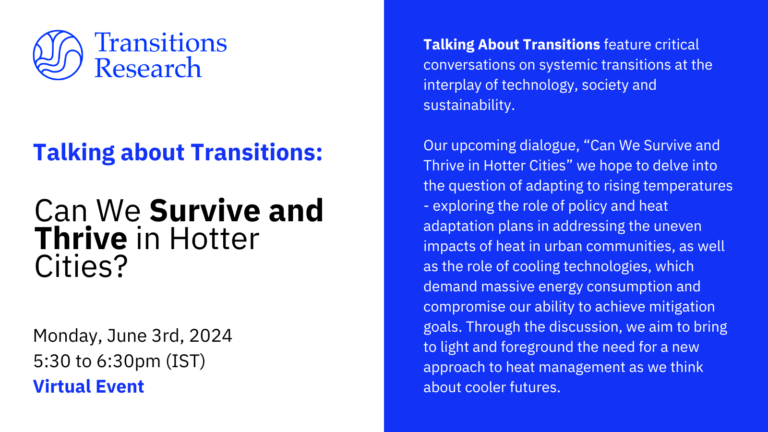Low Carbon Society
India is the 6th most vulnerable country to climate change impacts, according to the Global Climate Risk Index of 2018. India is also the world's third largest emitter of carbon after China and the United States. Considerations for a successful as well as socially just and equitable low carbon transition will need to go beyond focus on installed capacity of renewables to also address existing power asymmetries related to access, resource distribution and structural inequalities. As the climate changes we also need to ensure resilience in the systems that enable us to thrive and develop.
Climate Justice
Justice needs to be at the core of climate action. Marginalized social groups are likely to be disproportionately and differentially vulnerable to climate impacts. Shifts to a low-carbon economy will almost inevitably lead to loss of livelihoods among certain communities and existing inequities will be reproduced in low carbon systems. There is an increasing focus on just transitions in climate policy to tackle such issues. Our work aims to reimagine what climate justice looks like at the grassroots level and how the most vulnerable figure in the shaping of climate policies. How can a transition to a low-carbon society and adaptation to climate impacts address issues of social vulnerability and marginalization?
Social and Behavior Change
The carbon footprint of high income households is significantly higher than that of low income households. As India’s middle and upper class continue to prosper, they are likely to consume more through the lifestyle choices they make. Decisions individuals, households and communities make about how they move and consume will shape long term carbon mitigation. We identify behavioral solutions that hold the most promise in areas of urban mobility, household energy consumption, material use and food consumption. What levers of change - including awareness, economic incentives and disincentives and design choice architecture can be used to support social and behavioral change?
Social Planning of Energy Transitions
Low carbon energy pathways in India are likely to precipitate a range of social outcomes: redistribution of economic risks and opportunities; changes in social behaviour and norms; reorganization of labour markets away from carbon intensive sectors; new patterns of human habitation, and indeed, ideological debates over energy choices and development trajectories. Local issues of sustainability and inclusion also arise as planning mechanisms prioritise carbon targets exclusively. How are the social and the technological intertwined in efforts to transform energy systems in India?
Culture and Climate Change
Climate change is a global phenomenon but it plays out in specific landscapes in particular ways. It is shaped by our beliefs and cultural ways of seeing; it is connected to the places we can trace our ancestry to; it plays out on landscapes we call home. How we imagine and respond to climate change is culturally rooted. We will bring together artists, communities, environmentalists and researchers to engage in plural cultural perspectives on climate change in an Indian context. Our ambition to stimulate a cultural narrative that will engage and inspire societal action.
In this dialogue, we hope to delve into the question of adapting to rising temperatures - exploring the role of policy and heat adaptation plans in addressing the uneven impacts of heat in urban communities, as well as the role of cooling technologies, which demand massive energy consumption and compromise our ability to achieve mitigation goals.
As the world grapples with the complex crisis of climate change, it has become increasingly evident that a robust solution demands an inclusive approach. This year, as we commemorate International Women’s Day under the theme “Invest in Women: Accelerate Progress”, we highlight the crucial role of women’s economic empowerment in promoting equality. The theme “Inspire Inclusion” emphasises the importance of a broader approach that extends beyond just economic considerations....
Our recent Talking About Transitions Dialogue, Building a Net Zero Society, unpacked the importance of social transformations to achieve a low carbon transitions in Indian cities. How can we leverage behaviour change, equitable urban planning and innovative planning approaches to create an equitable net zero future?



